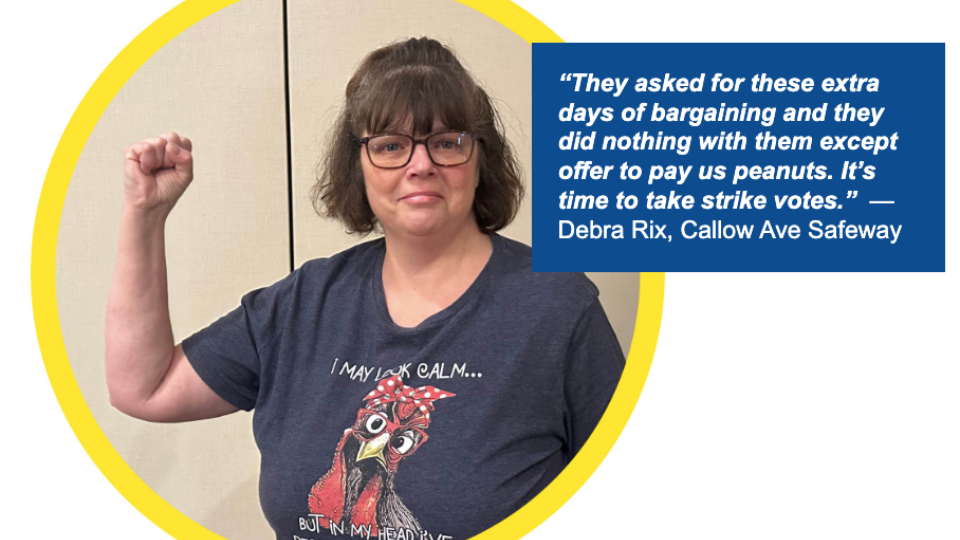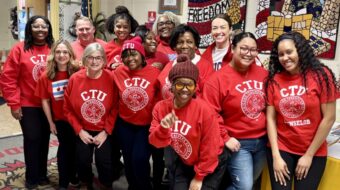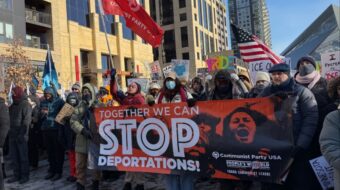
Grocery workers across the U.S., largely represented by the United Food and Commercial Workers (UFCW), are taking a stand this week against the corporate grocery giants, Kroger and Albertsons, as coordinated negotiations gain more support and popularity among the rank-and-file. Strike authorization votes are sweeping through multiple states and several UFCW locals in what could be one of the largest coordinated labor actions in the union’s history.
Over 150,000 UFCW and Teamsters grocery workers are currently negotiating. Tens of thousands of these workers, including in Colorado, Washington, and California, are taking strike votes this week. Many more could be joining with additional strike votes as the summer continues.
Kroger and Albertsons, the faces of “Big Grocery,” meanwhile, have funneled $9.5 billion combined into stock buybacks since 2023—money that could have raised wages for workers, lowered prices for consumers, and hired more staff for safer stores. But for Big Grocery (and corporations like them) maximizing profits at all costs is their only priority—the workers and customers be damned.
Across the board, however, workers are rejecting concessionary contract offers, speed-ups, short-staffing, healthcare cuts, and are demanding livable wages and basic dignity. They are setting the stage for potential strikes that could disrupt one of the grocery industry’s busiest seasons—a summer full of holidays, barbeques, and vacations—and make history in the process.
Workers draw line on poverty wages
Last week in Indianapolis, UFCW Local 700 members overwhelmingly rejected a Kroger contract covering 8,000 workers that offered “insulting raises”—some as low as $0.50 per hour—leaving some clerks at just $13.25 by 2029.
The concessionary proposal also excluded part-time workers from seniority rights and delayed spousal healthcare coverage for several years. After giving the workers just four days to review the proposal, 74% of workers voted it down, giving their union a strike mandate.
Similar grocery battles are unfolding in Southern California, where the Grocery Workers Rising coalition, representing over 50,000 workers at Ralphs, Albertsons, Vons, and Pavilions in UFCW Locals 135, 770, 1167, and 324, will vote this week on whether to authorize an Unfair Labor Practice (ULP) strike after the corporations “spied on, interrogated, and retaliated against union activists.”
“Everyone deserves fair negotiations without fear of retaliation,” the unions’ statement said. “We deserve fully staffed stores and fair pay that reflects our work. No one deserves to be bullied at work. By violating our rights, Kroger and Albertsons are making it harder to serve our customers and keep our stores running.”
Meanwhile, UFCW Local 7 in Colorado is still in the mix. After an 11-day February strike at 79 King Soopers stores, also owned by Kroger, the union’s members who work at Safeway, owned by Albertsons, are now voting on whether or not to authorize a strike. Safe staffing levels and poverty wages, unsurprisingly, are major concerns there too.
And UFCW Local 3000 is also voting to authorize a strike at both Kroger and Albertsons-owned stores across western Washington.
For decades now, UFCW negotiated contracts local by local, allowing Kroger and Albertsons to divide and weaken worker power. But after a coalition led by several UFCW locals defeated the attempted $25 billion merger last year, workers found that by organizing on a national level, their power was stronger and they could more effectively fight the Big Grocery corporations.
Now they are taking that lesson forward and organizing towards a “new” strategy, at least for the UFCW: coordinated bargaining. This summer, over 150,000 workers from Washington to Colorado have contracts expiring simultaneously, which creates unprecedented leverage that the unions could use to their advantage.
Stronger together
Last month, rank-and-file leaders from the UFCW’s reform caucus, Essential Workers for Democracy, came together from multiple states and launched a Rank & File Bargaining Exchange Program. They shared strategies and tactics across their locals to counter Kroger and Albertsons’ union-busting tactics and build towards a more unified bargaining approach for the UFCW.
If workers in California, Colorado, Indiana, Washington, and elsewhere all strike this summer, it would be a nightmare scenario for Kroger and Albertsons, especially during peak summer sales.
More importantly, it would be very significant for the UFCW and all workers to witness the collective power of the working-class unleashed on a national level—similar to the mass support of the 2023 national strike on the Big 3 automakers by the United Auto Workers.
“A strike is our most powerful weapon,” said Essential Workers for Democracy in their rank-and-file newsletter. “If we strike together, we win together.”
We hope you appreciated this article. At People’s World, we believe news and information should be free and accessible to all, but we need your help. Our journalism is free of corporate influence and paywalls because we are totally reader-supported. Only you, our readers and supporters, make this possible. If you enjoy reading People’s World and the stories we bring you, please support our work by donating or becoming a monthly sustainer today. Thank you!










